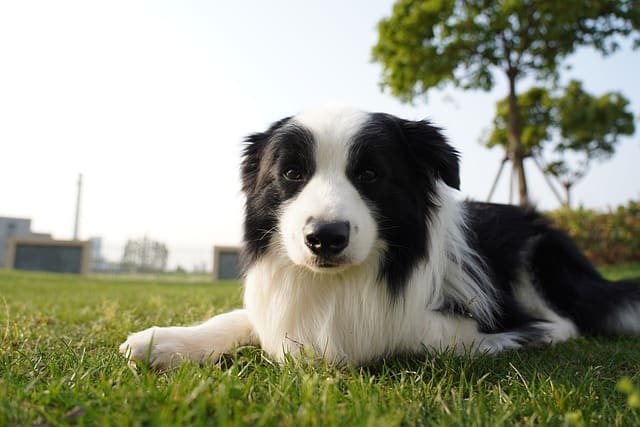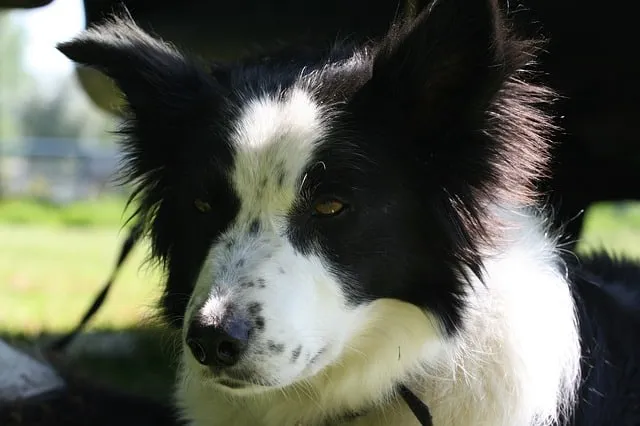Border collies are active, energetic, and speedy balls of zest and zeal., but, with a twist. Some human athletes may be talented on the field in sports, and able to achieve superhuman feats, but may be a tad lacking in the academic department.
The border collie is not only a superb athlete with their herding and agility abilities, but they are also considered the “Albert Einstein” of dogs, able to learn commands even before the stopwatch reaches 10 seconds! Truly amazing! They are also considered one of the smartest dogs in the world, usually ranking 1. consistently.
Even though border collies are great athletes and in wonderful shape, they still can develop health problems, some being breathing-related.
In this post, I will cover various breathing problems in the border collie and answer the question, “Why is my border collie breathing fast?” How to help the border collie with breathing will also be included.

For your dog’s vitamin supplement, foods, toys, or other dogs product please visit the Health Extension website.
What Are Breathing Problems in Dogs?
Breathing difficulties can occur in any breed of dog for any number of reasons and are signs that their respiratory system is too forced and strained.
The respiratory system sends oxygen to red blood cells and out to your border collie’s organs.
There are different types of breathing problems and these can be caused by underlying conditions such as congestive heart failure, lung tumors, tracheal collapse, bronchitis, or due to anatomy and also, simply, overexertion.
Some dogs with flat noses like French and English bulldogs, Pekingese, Shih Tzus, bullmastiffs, Lhasa apsos, and Boston terriers have breathing issues caused by nostrils that are narrow due to anatomy.
Types of Breathing Problems
Panting
Panting Symptoms are:
- Breathing that is shallow.
- Open mouth with tongue out.
Causes for panting:
- Higher body temperature due to exercise or fever caused by illness.
- Pain.
- Medication reaction.
Rapid breathing (tachypnea)
Rapid breathing (tachypnea) Symptoms are
- Quicker than normal breathing.
- Mouth closed.
Causes for Rapid breathing are
- Asthma.
- Heart failure with pulmonary edema (lungs fill with fluid).
- Low blood oxygen level (hypoxemia).
- Low red blood count (anemia).
- Bleeding in lungs.
- Tumors.
Breathing which is troubled (dyspnea)
Breathing which is troubled (dyspnea) Symptoms are
- Breathing with an open mouth.
- Nostrils flared.
- Rise and fall of the stomach and chest very noticeable with every breath.
- Clamorous breathing.
- The head is down as if struggling to breathe.
Causes for Breathing which is troubled (dyspnea)
- Heartworm infection.
- Throat blocked with a foreign object.
- Allergies.
- Pneumonia.
- Asthma.
- Reaction to a toxin, be it ingestion or from a tick bite.
- Kennel cough.
- Viral or bacterial infection.
- Bloat.
- Injury.
- Pulmonary edema.
- Heart failure.
To check your Border Collies’ health status or their DNA checks, please visit the Embark vet website for all the help you may need.

Breathing Problems Border Collies are Prone to
Border collies are susceptible to a few conditions which cause breathing problems. They may have some of the symptoms above. “Why is my border collie breathing fast?” This is a question you may ask if they suffer from any of the following conditions.
Malignant hyperthermia (overheating disorder)
According to the Merriam-Webster Dictionary, the definition of malignant is, “very serious and dangerous: tending or likely to grow or spread in a rapid and uncontrolled way that can cause death.” The definition of hyperthermia is, “exceptionally high fever, especially when induced artificially for therapeutic purposes.”
Malignant hyperthermia is most commonly seen in pigs, but now has also been identified in dog breeds, the border collie being one, along with greyhounds, golden and Labrador retrievers, pointers, springer spaniels, Saint Bernard’s, and Bichon Frise.
Overheating disorder or malignant hyperthermia causes your border collie’s temperature to become abnormally high, rising quickly, as well.
Triggers for this can be over-excitability, and exercise and can also be brought on by anesthesia. These anesthetics are ones in which muscular and neurologic systems are affected.
Malignant hyperthermia can lead to organ damage, muscle contraction, stroke, and even death. Symptoms can be:
- Breathing fast.
- Breathing with mouth open.
- Redness of the skin.
- Blue-tinged skin.
- The rapid increase in body temperature.
You may be wondering how to help the border collie with breathing in the case of malignant hyperthermia.
DNA testing is available for this, so you would be aware of this condition before there is a problem, and although there are questions if genetics and heredity play a role, dogs would not be bred which shows they are carriers.
Keeping your border collie calm, which can be quite difficult, and not overexercising would be necessary for avoiding incidences of this disorder.
If your collie needs anesthesia administered, they need to be monitored closely during dental and surgical procedures and ensure they are performed as quickly as possible.
Patent ductus arteriosus
As an embryo, in the womb, some of the border collie’s organs do not function normally yet because it isn’t necessary until after birth. The lungs are one such organ that depends on the ductus arteriosus to shuttle blood to the aorta from the pulmonary artery.
After birth, and in the first week, this ductus arteriosus should close completely allowing the lungs to receive blood directly with oxygen dispersed throughout the body normally. This condition arises when the ductus arteriosus remains open.
If untreated, patent ductus arteriosus will cause a build-up of blood in the heart’s left side, making it pump harder, and also fluid will build up in the lungs from an overabundance of blood flowing there.
Patent ductus arteriosus symptoms
- Constant heart murmur.
- Labored breathing.
- Coughing.
- Collapse.
- Eventual heart failure at the age of one or two.
- Death.
Patent ductus arteriosus can be diagnosed through a doppler, echocardiogram, x-rays, and/or EKG.
Patent ductus arteriosus is a congenitally linked heart defect that is the most common in puppies but is highly treatable if diagnosed in the early stages.
Surgery is the treatment of choice and is not a very difficult procedure, offering an excellent prognosis with your pup going on to live a normal life.
If it goes undetected too long, surgery is still an option but lifelong medications may be needed as well.
Border collie collapse
Border collie collapse is a disorder of the nervous system in which the trigger is vigorous and intense exercise. It is also referred to as exercise-induced collapse or “the wobbles.”
It has been identified in herding dogs and canines competing in fly-ball and agility contests in Australia, North America, and Europe.
Border collie collapse is a baffling condition with symptoms occurring between five and fifteen minutes after beginning exercise and in some dogs, developing signs five minutes after exercise. Symptoms are:

Border Collie Collapse Symptoms
- Swaying.
- Staggering.
- A galloping gait.
- Disorientation.
- All focus is lost.
- Collapse.
Oddly, affected dogs have symptoms for around five to 30 minutes but then return to complete normalcy with absolutely no after-effects.
Breeds that can be affected by this condition are the Shetland sheepdog, Australian shepherd, Australian cattle dog, collie, and the border collie. Dogs suffering from border collie collapse should be retired.
Whatever the cause of your border collie’s breathing problems, working closely with your veterinarian and following their instructions for your collie’s specific needs is a must.
Depending on the diagnosis, treatment may be temporary or a new way of life for your border collie and you.